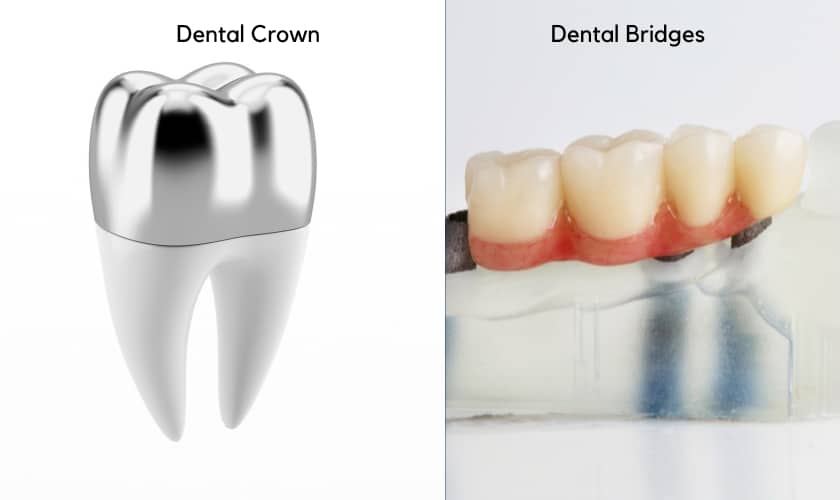Did you know that according to the American Academy of Implant Dentistry, approximately 15 million Americans have crown or bridge replacements for missing teeth? When it comes to dental restoration, crowns and bridges are two common options. Understanding their nuances, benefits, and drawbacks can be pivotal in making an informed decision about your oral health.
The Purpose and Function of Dental Crowns and Bridges
Before we dive into the pros and cons, let’s understand the basics. Dental crowns and bridges serve different purposes but share the common goal of restoring dental aesthetics and functionality.
A dental crown, often referred to as a cap, is a custom-designed covering placed over a damaged or decayed tooth. Its purpose is to restore the tooth’s original shape, size, strength, and appearance. On the other hand, a dental bridge fills the gap created by one or more missing teeth. It consists of two or more crowns for the teeth on either side of the gap, with a false tooth or teeth in between, effectively bridging the gap.
Pros and Cons of Dental Crowns
Dental Crown Pros:
- Strength and Durability: Dental crowns are renowned for their durability, providing long-term restoration for damaged teeth.
- Cosmetic Enhancement: Crowns improve the appearance of misshapen or discolored teeth, enhancing your smile.
- Protection: They offer protection to weakened teeth, preventing further damage.
- Versatility: Crowns can be used for various dental issues, including large fillings, root canal-treated teeth, and dental implants.
Dental Crown Cons:
- Invasive Procedure: The process of getting a crown involves significant tooth reduction, which can weaken the tooth.
- Cost: Crowns tend to be more expensive than some other dental treatments.
- Potential Sensitivity: Some individuals may experience sensitivity after getting a crown, especially to hot or cold temperatures
Pros and Cons of Dental Bridges
Dental Bridge Pros:
- Restored Functionality: Bridges restore the ability to chew and speak properly, improving overall oral function.
- Preventive Measure: Filling the gap left by missing teeth prevents adjacent teeth from shifting and causing alignment issues.
- Natural Appearance: Bridges are customized to blend seamlessly with your natural teeth, providing a natural-looking smile.
- Non-Invasive: Unlike dental implants, bridges do not require surgery for placement.
Dental Bridge Cons:
- Dependency on Adjacent Teeth: The health and stability of adjacent teeth are crucial for the success of a dental bridge.
- Potential for Decay: Difficulty in cleaning under the false tooth of the bridge can increase the risk of decay and gum disease.
- Limited Lifespan: While durable, bridges may need replacement after a certain period, typically 5 to 15 years.
Factors to Consider When Choosing Between Crowns and Bridges
When deliberating between dental crowns and bridges, several factors warrant careful consideration to ensure the most suitable choice for your oral health needs. Here are key factors to weigh:
- Extent of Tooth Damage: Assess the severity of the tooth damage or decay. Dental crowns are often recommended for restoring individual teeth with significant damage or undergoing root canal therapy. Conversely, dental bridges are ideal for filling in gaps caused by one or more missing teeth.
- Overall Oral Health: Consider the condition of surrounding teeth and gums. Dental crowns require sufficient healthy tooth structure for support, while bridges rely on adjacent teeth for anchorage. If neighboring teeth are compromised, alternative options like dental implants may be more suitable.
- Longevity and Durability: Evaluate the expected lifespan and durability of each option. Dental crowns typically offer longer-term restoration, with studies indicating high success rates even after ten years. Conversely, dental bridges may require replacement every 5 to 15 years, depending on various factors such as oral hygiene practices and material used.
- Cosmetic Considerations: Reflect on aesthetic preferences and the desired outcome. Dental crowns are customizable to match the color, shape, and size of natural teeth, making them ideal for cosmetic enhancement. Bridges also aim for a natural appearance but may pose challenges in mimicking the texture and translucency of real teeth, especially for front teeth.
- Treatment Invasiveness: Consider the invasiveness of each procedure. Dental crowns entail significant tooth reduction to accommodate the crown, which may compromise tooth structure. In contrast, bridges involve minimal alteration of adjacent teeth but require precise preparation to ensure proper fit and function.
- Maintenance Requirements: Evaluate the ease of maintenance and potential oral hygiene challenges. Dental crowns and bridges both require regular brushing, flossing, and dental check-ups to prevent decay and gum disease. However, bridges may pose difficulties in cleaning under the false tooth, increasing the risk of plaque buildup and oral health issues.
- Cost Considerations: Factor in the initial cost and long-term expenses associated with each option. Dental crowns tend to be more expensive upfront due to material and fabrication costs but may offer greater value over time due to their longevity. Conversely, bridges may be more cost-effective initially but require periodic replacement, leading to cumulative expenses.
In the realm of dental care, the choice between dental crowns and bridges is not always straightforward. Each option presents its own set of pros and cons, requiring careful consideration based on individual needs and circumstances. Whether you opt for the strength and versatility of crowns or the functional and aesthetic benefits of bridges, consulting with your dentist is key to achieving the smile you desire.
